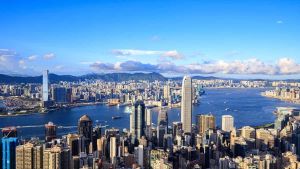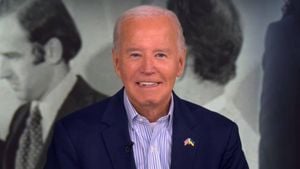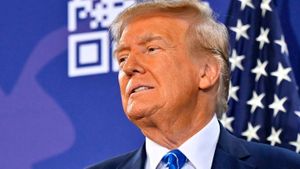With the elections around the corner, Indian Prime Minister Narendra Modi is ramping up his political campaigns, striving to solidify his party's position across various states. His recent visit to Darbhanga, Bihar, marked another significant moment where he laid the foundation for several healthcare initiatives aimed at enhancing medical education in the region, signaling his commitment to improving healthcare accessibility, especially for the youth seeking careers in medicine.
While addressing the villagers, Modi declared, "Within the next five years, we will be adding 75,000 new medical seats across the country," highlighting the government’s efforts to combat the shortage of healthcare professionals. The promise aims to not only address the growing demand for medical practitioners but also to inspire confidence among potential students and their families about the seriousness of the government's commitment to healthcare infrastructure.
This announcement coincided with Modi's broader vision as he embarks on his G20 Summit participation, indicating India's global leadership aspirations. Modi's government has been vocal about its plans to take India to new heights by fostering education, creating job opportunities, and developing infrastructure. The added medical seats form part of this grand design, aimed at ensuring future generations have access to quality education and healthcare services without incurring heavy debts.
Later this month, Modi plans to visit Nigeria as part of his diplomatic outreach. This marks his first official visit to Nigeria—an important partner for India—since 17 years. The visit, as noted by officials from the Indian Foreign Ministry, is part of reviewing and strengthening the existing cooperative ties developed since 2007. Modi aims to discuss enhancing bilateral relations, focusing on economic, energy, and defense collaborations.
During his trip to Nigeria, Modi will meet President Bola Ahmed Tinubu, and will also engage with the Indian community living there. It is expected to showcase India's growing influence and investments—as over 200 Indian companies have invested over $27 billion collectively across multiple sectors within the Nigerian economy. The trip will include discussions on the significant development cooperation between both nations.
Modi’s international agenda extends beyond Nigeria as he travels to Brazil for the G20 Summit, where global leaders will converge to discuss pressing issues ranging from economic policies to climate change. Here, Modi will present India's viewpoints on various international matters, leveraging India's experiences and policies implemented over the past years. Notably, his participation highlights India's status as part of the G20 Troika—a position shared with Brazil and South Africa—indicating its growing global stature.
The backdrop of these travels also brings attention to domestic politics, where Modi and the BJP face mounting challenges from the opposition. Sharad Pawar, the Nationalist Congress Party chief, recently raised concerns during his rallies, asserting, " Modi aimed for 400 seats during the Lok Sabha elections to amend the Constitution," implying sinister intentions behind such numbers. He criticized the BJP's approach and claimed they were potentially seeking to dilute democratic values as laid out by the Constitution crafted by Dr. B. R. Ambedkar.
Pawar's comments reflect the growing anxiety among opposition circles as they unite against what they perceive as Modi’s heavy-handed governance style. His remarks during election rallies suggest the opposition's strategy aims to awaken public consciousness about potential erosion of rights under Modi’s leadership. Recent state elections present these factions with opportunities to challenge the BJP’s dominance, which, they argue, risks curtailing democratic provisions.
Despite the opposition's efforts to rally against Modi, there's no denying his political savvy. His ability to connect with the masses and present solutions, especially through initiatives geared toward healthcare and education, forms part of his strategy to win voter confidence. Modi's rhetoric often revolves around safeguarding Indian identity and interests, emphasizing traditional values which resonate with his supporters.
During his campaign trails, Modi has accused rival parties of harboring infiltrators and compromising the safety of indigenous populations, particularly targeting the tribal communities within Jharkhand. By stating, "The statistics show the tribal population has halved due to these infiltrations," he aims to elucidate the pressing concerns over demographic changes which have caused societal anxiety. He promises to protect local sentiments around 'Jal, Jungle, Jameen'—water, forests, and land—serving as the foundation of the tribal identity.
Fueling the sentiments surrounding national identity and safety, Modi has pointed fingers at the incumbent Jharkhand Mukti Morcha-Congress coalition, alleging they have paved the way for illegal settlements, claiming they prioritize appeasement politics over governance. His narrative aims to paint the BJP as the guardian against perceived external threats, consolidates votes primarily along communal and nationalistic lines.
Opposition members have countered Modi’s assertions, alleging his government is playing divisive politics. JMM spokesperson Manoj Pandey criticized Modi directly, stating, "The BJP attempted to amend acts protecting tribal land during its previous regime, the C.N.T. and S.P.T. acts. The JMM stands firm on the rights of the tribals. If Modi is concerned about infiltrations, he should question his party's leadership at the center." This exchange marks the intense friction defining current political landscapes as the assemblies prepare for polls, which could dramatically alter the power equations.
With the election campaigns heating up amid Modi’s international commitments, the next few weeks promise to be pivotal for his administration and the future of his lengthy leadership quest. While Modi is out attempting to entrench India's global rapport, his actions at home must also reflect the expectations of those he serves.
This duality of approach, encapsulating both diplomatic endeavors and grassroots connectivity, summarizes Modi's overarching political strategy. He is accustomed to balancing regional aspirations with populist sentiments, often employing bold promises aimed at economic upliftment and sovereignty. Whether the electorate segments view these initiatives favorably remains to be seen as elections draw closer.
Current trends signal Modi ensuring the Modi-led BJP's dominance won’t be challenged easily. His recent announcements and international forays amplify the image of progress, positioning him as both the initiator of healthcare reforms at home and the statesman during pivotal geopolitical engagements abroad. The calculus of Indian politics continues to evolve as Modi juxtaposes domestic realities against his ambitious global aims.



